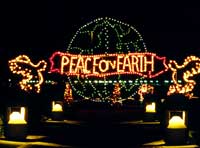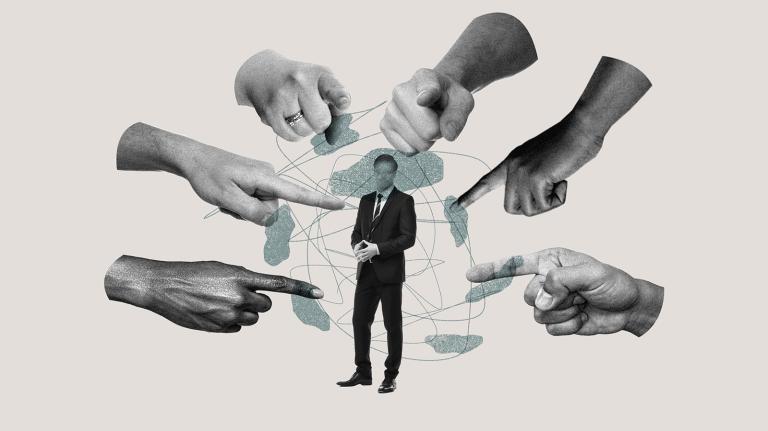This holiday season, we’re bombing Afghanistan, and perhaps contributing to mass starvation there. We stand apart from the rest of the world on climate change, ignoring the melting ice at the North Pole and rising global temperatures. As if the killing and bombing and starving weren’t bad enough, we’re not just at war with other people: We’re trying to fight the entire biosphere.

A light message.
Photo: ArtToday.
This season, as never before, I am cringing at the holiday cheer. I grew up in the Christian tradition, and while it has always taken some effort to find reflections of the man who said “love thy enemies” in the standard American Christmas, this season, with the world’s wounds staring us straight in the face, the contradictions are haunting me.
Before you decide I am being melodramatic, think about oil. Oil has defined U.S. foreign policy for decades … and could be conveniently piped through Afghanistan, given a friendly government there … and releases greenhouse gases when it is burned.
And now think about how so many of us celebrate the holidays. The gasoline-powered car-ride to grandmother’s house. The presents, manufactured far away and shipped around the world in boats, planes, trains, or trucks fueled by oil. The Christmas ham, from a pig fed with corn that was fertilized with chemicals that were synthesized using fossil fuel.
Without meaning to do any harm, we’re all trapped in this big tangled mess. One strand of the tangle connects oil with war and sky-high defense budgets. Another connects oil with global warming. Another connects oil with the way we live, and the way we live with the way we celebrate.
Organic Chestnuts Roasting on a Sustainable-Wood Fire
The only way I know to untangle a knot is to find a loose strand and pull on it. So this year, I am starting with the strand of Christmas, connected as it is with the strands that lead to oil and to the rest of my life. I’m starting with Christmas, and I’m trying to make it an oil-free day.
I’m getting excited about the nearby maker of wooden toys. My mind is turning toward gifts of seeds and compost buckets and donations for refugee relief. I’m making my own amateur illustrations of our homegrown bedtime stories. I’m looking for local organic food for the holiday menu. In my favorite cookie recipe, I will try substituting maple syrup bottled by my friends for molasses from the Caribbean. And I can already taste the pie made from pumpkins grown by farmers in my community, rich with cream from their Jersey cows. We’ll leave the lights turned off on Christmas day and let the kids arrange the candles on the Christmas table.
Will we really have an oil-free Christmas? Of course not. I’ve already driven to the toymaker’s shop, we’ll cook the turkey in an electric oven, and we’re traveling to my parents’ house, a 90-mile trip we will make in a car.
No matter how hard I try, my Christmas won’t be pure. There will a dull ache in my heart and in my conscience. I can do a lot, but I can’t leap out of this oil-dependent culture in one jump. Luckily, my heart seems to keep working despite the aching, and the only thing I see to do is just keep working at it until, someday, my Christmas really is solar-powered. Until, along with the candles and the wooden toys, we have a modern rail system to carry us to grandmother’s.
This, too, is part of the strategy for untangling a knot. You can’t unravel it by working on just one strand. You have to start somewhere, but you also have to follow the tangles where they lead. And none of us will be free of the oil-habit until we get together and demand efficient, convenient trains, and fuel cells, and wind- and solar-powered electricity grids.
There is no doubt about it: Knots and tangles are aggravating. There is nothing more frustrating than discovering a knot in the yarn with which you are knitting a sweater. All you want to do is knit, not untangle knots. You can grumble and complain and resist — but, unless you are willing to abandon the sweater, you need to start with the knot.
But here’s a secret about knots: If you gently tug at a strand or two, you might discover that untangling knots is absorbing, honorable work. You might sit by the fire, in the company of friends, and sing and tell stories while you get the yarn straightened out and begin to knit again. You might discover some unexpected joy.
So many people want to convince us that sustainability means sacrifice or deprivation. But try telling me that while eating maple cookies by the light of Christmas candles. I’m not the one missing out on anything. And here, in discovering our ability to turn towards our future with intentional celebration, here is where our power is. We can walk and bike, eat local food, borrow and lend, patch and mend, carpool, sow and harvest right on out of the tangled old mess of a world we’ve inherited. We can sing at the top of our lungs all the way.

